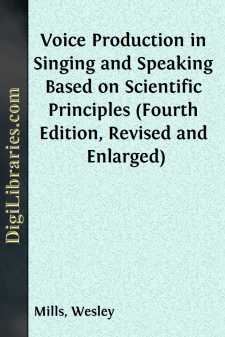Categories
- Antiques & Collectibles 13
- Architecture 36
- Art 48
- Bibles 22
- Biography & Autobiography 813
- Body, Mind & Spirit 142
- Business & Economics 28
- Children's Books 17
- Children's Fiction 14
- Computers 4
- Cooking 94
- Crafts & Hobbies 4
- Drama 346
- Education 46
- Family & Relationships 57
- Fiction 11829
- Games 19
- Gardening 17
- Health & Fitness 34
- History 1377
- House & Home 1
- Humor 147
- Juvenile Fiction 1873
- Juvenile Nonfiction 202
- Language Arts & Disciplines 88
- Law 16
- Literary Collections 686
- Literary Criticism 179
- Mathematics 13
- Medical 41
- Music 40
- Nature 179
- Non-Classifiable 1768
- Performing Arts 7
- Periodicals 1453
- Philosophy 64
- Photography 2
- Poetry 896
- Political Science 203
- Psychology 42
- Reference 154
- Religion 513
- Science 126
- Self-Help 84
- Social Science 81
- Sports & Recreation 34
- Study Aids 3
- Technology & Engineering 59
- Transportation 23
- Travel 463
- True Crime 29
Voice Production in Singing and Speaking Based on Scientific Principles (Fourth Edition, Revised and Enlarged)
by: Wesley Mills
Categories:
Description:
Excerpt
CHAPTER I.
THE CLAIMS AND IMPORTANCE OF VOCAL PHYSIOLOGY.
To know consciously and to do with special reference to guiding principles are to be distinguished from carrying out some process without bearing in mind the why or wherefore. Science is exact and related knowledge, facts bound together by principles. Art is execution, doing, and has not necessarily any conscious reference to principles.
While every art has its corresponding science, their relation is in some cases of much greater practical importance than in others. While a painter may be the better for knowing the laws of light, there can be no question that he may do very good work without any knowledge whatever of the science of optics. He is at least in no danger of injuring any part of his person.
Entirely otherwise is it with the voice-user. He employs a delicate and easily injured vital apparatus. His results depend on the most accurate adjustment of certain neuro-muscular mechanisms, and one might suppose that it would be obvious to all who are concerned with this art that a knowledge of the structure and functions of these delicate arrangements of Nature would be at least of great if not of essential importance. The engineer knows the structure and uses of each part of his engine, and does not trust to unintelligent observation of the mere working of mechanisms which others have constructed. The architect studies not only the principles of design, etc., but also the nature and relative value of materials. In his own way he is a kind of anatomist and physiologist.
We do not trust the care of our bodies to those who have picked up a few methods of treatment by experience or the imitation of others. The doctor must have, we all believe, a knowledge of the structure and working of the animal body; he must understand the action of drugs and other healing agents. We expect him not only to diagnose the disease—to tell us exactly what is the matter—but also to be able to predict with, some degree of certainty the course of the malady. Even the nurse of the day must show some grasp of the principles underlying her art.
In connection with all the largest and best equipped universities in America there are officials to plan and direct the courses in physical culture. This matter is no longer entrusted to a "trainer," who has only his experience and observation to rely upon. It is realized that the building up of the mechanism which they are supposed to train in an intelligent manner rests upon well-established principles.
It would be just as reasonable for an engineer to point to the fact that his engine works well, as evidence of his ability, as for the teacher of voice-production to make the same claim in regard to the vocal mechanism. In each case there is a certain amount of justification for the claim, but such teaching cannot be called scientific. Is it even enlightened? It is just as rational to follow in medicine methods that seem to lead to good results, without any reference to the reason why, as to train for results in speaking and singing by methods which have for the student and teacher no conscious basis in scientific knowledge. The physician to-day who treats disease without reference to anatomy and physiology is, at best, but a sort of respectable charlatan. Why should students and teachers of voice-production be content to remain, in the advanced present, where they were hundreds of years ago?
Indeed, there is much more reason now than formerly why the vocalist, speaker, and teacher should have a theoretical and practical knowledge of the structure and workings of the mechanism employed. Many tendencies of the present day work against successful voice-training—worst of all, perhaps, the spirit of haste, the desire to reach ends by short cuts, the aim to substitute tricky for straightforward vocalization, and much more which I shall refer to again and again. They hurt this cause; and I am deeply impressed with the conviction that, if we are to attain the best results in singing and speaking, we must betake ourselves in practice to the methods in vogue at a time which may be justly characterized as the golden age of voice-production....


